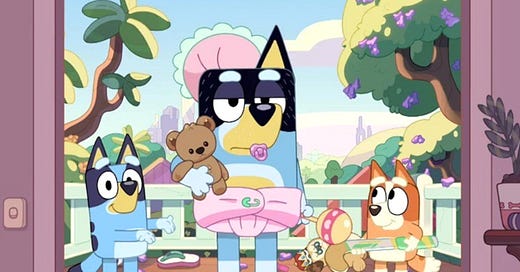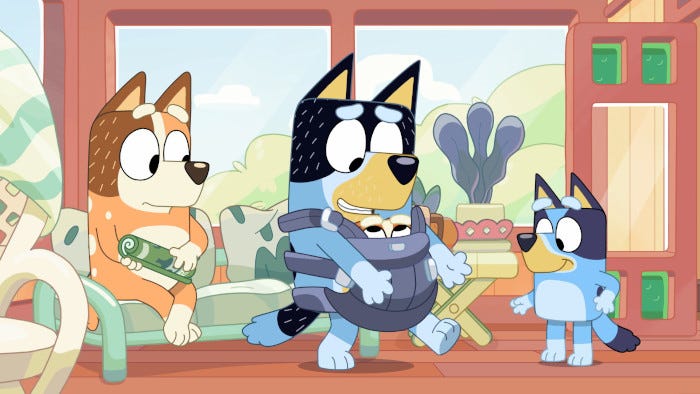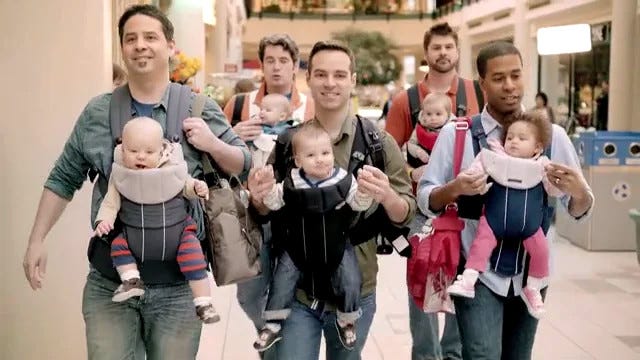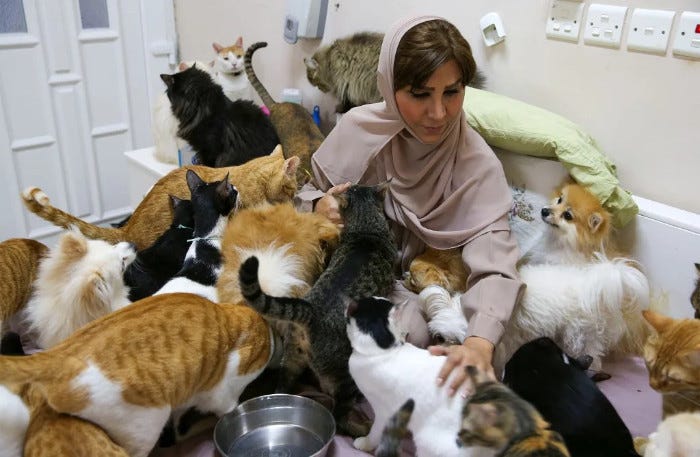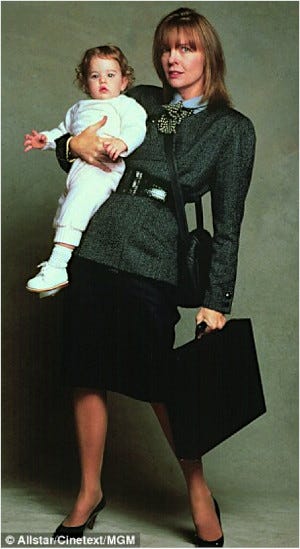The Devolution of Marriage and Parenting Into Buddy-hood
– 29 March 2024 –
Janus:
The parents of young children all rave about the wonders of the Australian cartoon Bluey. “Oh, you’ve just got to watch Bluey! Bluey shows the real struggles of childhood and parenting, but everyone is so engaged with one another! Bluey’s dad is especially the best!”
My wife wanted me to watch this show that so much impressed her. So I watched a few episodes with our young children. I found the writing to be emotionally engaging and the show entertaining. The messages, on the whole, seem wholesome enough. Both parents lovingly involve themselves in playing with their two daughters and in supporting one another. The dad, Bandit, especially involves himself in the day-to-day lives of the children; in fact, Bandit frequently joins his children’s world even when he feels tired or otherwise busy, and he constantly seems (to steal a word that so perfectly embodies Bandit’s amazing efforts) beleagured. Yet he always comes through for his wife and children! An all-around modern hero, Bluey’s dad is!
Yet, after watching this show, something really bothered me about Bluey. And I couldn’t quite pinpoint what bothered me so much.
Did I merely feel guilty for not so endlessly engaging my own wife and children as Bluey’s dad so energetically manages to do? Or did I merely resent the way that Bluey’s mom Chilli constantly runs off to work or to perform other errands or to do who-knows-what while the dad bends over backwards to serve everyone else? Yes, those things bothered me, but they didn’t hit the root of the issue.
Then I read this surprisingly thoughtful article from The New York Times, and I saw what really unsettled me about Bluey (though the article itself doesn’t directly address it.)
Via The New York Times:
In the first episode of “Bluey,” the Australian children’s series about an animated family of blue heelers, the mama dog, Chilli, drives off to work, leaving her husband, Bandit, to care for the pups. They play a game requiring Bandit to freeze in increasingly silly scenarios — fingers in his nose, sock on his tail, garden hose blasting him right in the face. Much of the series is a showcase for Bandit’s virtuosic performances in his daughters’ imaginative schemes. In subsequent episodes, he serves as their beleaguered hospital patient, beleaguered robot, beleaguered horse.
“Bluey” has been praised for its rare and complex depiction of parents, and Bandit has been commended as an exceptional father. Tribute is paid in Bandit Facebook groups, Bandit memes and custom Bandit fan merchandise. He is a fun dad who does housework, too. In one episode, he dances into the kitchen, shouts “What’s up, party people?” and plops a basket of freshly folded laundry on the floor.
I don’t know how he keeps house, works as an archaeologist and serves as a full-time prop artist to his daughters, but he does it all while only feigning complaint. He is not only a good father — he is a fantasy, one crafted to appeal to adults as much as to children.
[. . .]
So Bandit’s omnipresence is odd, and striking. He is like Mary Poppins, stitching together a family with creative prop work. Or he’s the Cat in the Hat, leading children in controlled chaos while their mother is out. His closest analogues in children’s media are not other parents, but the fools and tricksters that children encounter when they are allowed to roam unsupervised. Bandit represents a parent freed of drudgery, one whose central responsibility is delighting his kids.
[. . .]
It’s a weird time for father figures. On Instagram and TikTok, I’m constantly being served memes and posts that mock dads for not knowing their kid’s birthday or for taking endless bathroom breaks to scroll through their phones. In one persistently circulating joke, the dad stands uselessly in the kitchen, right in front of the drawer that the mom needs to access. I don’t actually know any fathers like that; in real life, the fathers I know are much like the mothers I know, and we’re all competing for private toilet time.
This online character feels like a throwback to the lazy sitcom dad glued to the living room couch watching television, though on social media he inspires an intensified level of resentment. Dads who don’t pull their weight are shamed for it now. But dads who contribute still get praised.
The moms in “Bluey” and “Chip Chilla,” Chilli and Chinny, don’t get the classic Disney-movie treatment: They are allowed to live. They get to join in the fun, too, though Chilli is more levelheaded than her husband and Chinny is stern. Both mothers are granted supporting roles in their children’s imaginative worlds, though they are somewhat sidelined by their plots, often because of their work outside and within the home. In “Chip Chilla,” Chinny is the one stuck holding the laundry basket.
Really, it was this article along with an article from my own site that together highlighted the root of the problem with Bluey.
C. F. van Niekerk wrote this back in December:
There was a time when tough, disciplined working dogs productively served their masters, and the masters respected the dogs for their work. Both men and dogs worked together for their common survival against the wild beasts always lurking in the shadows that would snatch away the fruits of both of their labor.
Then what happened?
Even the working dogs became pampered family pets for play and amusement and for the empty companionship of food scraps while watching Marvel movies on the hair-caked couch. Both men and their dogs became fat, stupid, domesticated parodies of themselves. Micro-chipped poop-rollers inside an invisible fence. Sterilized dog moms with their neutered cuddle bears making 15-second videos for follows-and-likes on TikTok.
Men and their dogs ceased to be masters of themselves and they became pets of the system under foreign masters who despise real men and working dogs both, flooding the nations with snakes and monkeys and laughing hyenas while overpriced veterinarians offer pet anti-depressants and debarking surgery covered under canine insurance.
A functional society of Europeans thrives on well-trained working dogs. Instead we now have coddled pets and roaming exotic beasts. We have overgrown adolescent ‘dudes’ and female ‘guys’ who won’t even walk their dogs or house train them (just as they themselves don’t cook or clean), and these careless owners dump their pets at the pound or in the streets when these animals don’t act like perfect little children.
I realized what was now true about the family dog was also true of the relationships between husband and wife, and between parents and their children.
I realized where Bluey gets it so wrong: the parents have reduced themselves to the level of pampered children, constantly playing and effacing themselves to the emotional levels of their children, becoming buddies and equal playmates to their children, especially the father. And within their marriage, the husband serves as a supportive wife to his wife. The father becomes buddy and servant to all within a partnership of equals, or supposed equals.
Today’s marriages have transformed themselves into a mission of personal happiness and mutual comfort for each equal individual. Parenthood has likewise transformed into a mission of self-fulfillment and the joys and comforts of mutual companionship.
The husband is the house-pet to his wife, and the wife is the pet of her husband. The parents are house-pets to their children, and the children are pets to the parents! It’s all about personal comfort!
On the one hand, people humanize their pets so much that they consider them to be personal equals, or more than equals. They indulge their pets and expect very little, if anything, from them. On the other hand, people dump their pets off at the pound if the creatures interfere too much with their lifestyles. And this is the nature of families today!
Bluey is so popular, and the show seems so wholesome, because it features a family that plays together and interacts together, rather than the typical broken family that stares silently into a multitude of individual screens over fast food rubbish.
Bluey isn’t a terrible show. If children only occasionally watch Bluey, the show seems fairly harmless. There is no question whatsoever that the interactions Bluey portrays, however fancifully, promote a healthier family dynamic than the atomized gulf that exists everywhere today. Compared to the reigning Dystopia, Bluey amounts to today’s Little House on the Prairie.
But this is like saying, “Compared to Red Bull and Doritos, chocolate milkshakes and french fries provide so much more nutrition!” Still, does a diet of milkshakes and french fries provide enough nutrition for a healthy life? Of course not.
The fantasy of the show Bluey raises expectations on fathers that harm families the same way that the fanciful 1980’s working supermoms raised unreasonable expectations on mothers in another generation. In fact, messages like Bluey’s enable the frenetic dysfunction of the working supermom! Today’s egalitarian society must have the supermom, we are told, which is impossible, so we must therefore have the ever-supportive super dad-child to support her and the children, which amounts to just as great an impossibility! This is delusion!
And the delusion causes further harm to the children. When parents constantly reduce themselves to the level of children, then what happens to the children? Nothing is expected of them! They grow up to be self-centered, over-indulged, useless permanent adolescents. They become pampered pets who need someone else to take care of them forever, or else they will live like stray Cocker Spaniels trying to scrounge for garbage in the streets. These children won’t have the tools to survive as adults!
Rather than the parents lowering themselves to the level of children’s buddies and playmates in order to spend quality time with them (and to relive their childhoods), they should raise their children to the level of productive citizens, giving them useful work and expecting productive results for the sake of the whole family as a team, and they can spend quality time and have fun with their children that way!
Rather than everyone indulging everyone else like pampered pets, and throwing each other away when these pets no longer “make them happy,” it is absolutely necessary to build and maintain the natural family hierarchy, with the husband and father at the head, with the wife and mother supporting him as the heart, and both guiding and building the children who are the limbs.
Bluey amounts to a misleading fantasy. However much the show may inspire fathers to emulate Bandit, the feat is impractical, and the results are ultimately harmful. In all reality, when everyone is equal, the family has no lasting stability or peace. We see this misery and dysfunction everywhere, all because of false equality! Families break apart. Parents alternately neglect and then over-indulge their children. The children grow fat and idle and depressed, or full of senseless violence. False equality is destroying everything.

That’s big talk from me about family hierarchy, of course. Certainly my own family structure doesn’t measure up to the standard that I have myself presented in this article, if I want to be candid about it.
After watching the show, I told my wife that I didn’t think Bluey was terrible, but that I had a problem with the parents, especially the father, kowtowing to the children. It gives children unrealistic expectations, I said, and I could observe some of the truth of this from my own children’s behavior with me. My wife didn’t agree about the show, nor do I think she really understood what I was trying to say, except that I wasn’t a huge fan. So she doesn’t play Bluey when I’m around.
I’ve made quite a bit of progress in taking leadership and building hierarchy over the last handful of years. It’s a difficult process, some of it imposed unilaterally, and a lot of marriages wouldn’t have survived even that limited measure of progress, either! Mine almost didn’t, and the marriage could still tank, though as I said the progress is real and beneficial, if limited.
Building hierarchy in a family is a difficult process in this age of equal rights nonsense, but hierarchy is absolutely needed, if not always appreciated. All women in the West—yes, all of them, unless they belong to some fringe religious sect, even the so-called “trad” women!—are practical feminists if not necessarily ideological feminists. Some Christian woman can be convinced, if only intellectually, of this need for male leadership, but in practice they still try to rule, or let the children rule, and they still feel like they have the right. The whole system backs women up, and increasingly children, and men have very little leverage! (And frankly, too many men are pussies. A man has to accept the possibility that the marriage might crash and burn, and to not care about that too much.) So we do the best we can with the poor situations that we have.
[Edit 22 April 2024: Bluey’s gone gay. No real shocker there. Just avoid it! And everything else that’s made after, say, 2015.]

